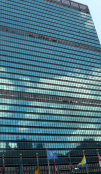International Day of Multilateralism and Diplomacy for Peace

As we mark this occasion, we reaffirm our unwavering commitment to the United Nations Charter and the principles of multilateralism, recognising that they are the only means by which we can guarantee the right to peace and prosperity for all people across the globe.
The UN Charter serves as the foundation for international law and outlines the principles of peace, cooperation, and respect for human rights that all member states agreed to adhere to. By upholding the Charter, countries can prevent conflicts, promote sustainable development, and protect the rights of all individuals, regardless of their nationality or background. This is especially crucial in light of the numerous complex challenges that the world is currently facing.
Peace is a prerequisite for sustainable development – and vice versa – and thus a vital foundation for achieving the 2030 Agenda and its 17 Sustainable Development Goals (SDGs). This is a priority for the EU, which in July will submit its Voluntary Review of progress and challenges in SDG implementation at the UN High-Level Political Forum. The review, the EU's first since the adoption of the 2030 Agenda in 2015, is an opportunity not only to assess the achievements to date, but – importantly – to give a renewed boost to the SDGs at the global level. Together with partners, the EU will work towards a successful SDG Summit in September that delivers ambitious outcomes.
The EU is fully behind the UN Secretary-General’s vision of a reinvigorated multilateral system known as “Our Common Agenda” (OCA). It is an opportunity that can't be missed: the proposed global governance reforms will make the UN-centred multilateral system future-ready. There is widespread acknowledgement that the UN and the global governance system are in need of reform. Together with its many different tracks, such as a New Agenda for Peace and the Global Digital Compact, the Common Agenda represents an historic opportunity for change and the EU is committed to delivering on it with an ambitious outcome at next year’s ‘Summit of the Future’. The EU is a key player in this process and will continue to support it.
The goal is to address the root causes of conflict and instability, and promote democratic values and inclusive societies across the globe. The Common Agenda should serve to accelerate the implementation of the 2030 Agenda, the most ambitious Peace Plan to date, and provide the UN-centred multilateral system with an essential global roadmap for sustaining peace. The EU remains fully committed to support the UN-centred multilateral system as the best vehicle we have to reach a better and safer future for all. Because multilateralism works.





